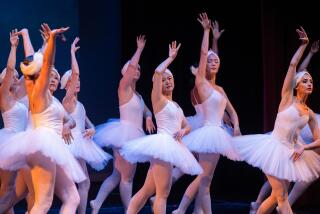Majesty and Missteps
- Share via
If you consider the Moscow Stanislavsky Ballet as primarily a contemporary creative instrument, it’s easy to understand the strengths and weaknesses of its local debut Tuesday at the Kodak Theatre in Hollywood.
Officially the dance component of the Stanislavsky and Nemirovich-Danchenko Moscow Music Theatre, the company is known for works that extend, deepen and personalize the academic classical tradition. So if its current seven-performance engagement emphasizes hand-me-down repertory, this is very much a company sideline, not its specialty.
The opening mixed bill or gala dutifully assembled some of the leading names in Russian choreography: Marius Petipa, of course, but also Mikhail Fokine, Leonid Lavrovsky and Victor Gsovsky. (Other Russian icons will be danced later in the engagement.) But the company looked like a world-class ensemble only in private property: artistic director Dmitry Bryantsev’s neo-Romantic 1995 Chopin suite “The Spirit Ball.”
In a gauzy, ghostly ballroom designed by Vladimir Arefiev, five couples caught in a meaningless social whirl relived relationships through a series of fantasy duets--each one rich in feeling, technical challenges and choreographic invention.
Not everyone looked effortless in the unusual lifts and floor maneuvers (supported turns with the woman rolling delicately across the stage, for instance), but everyone danced as if given a gift, an opportunity and a token of respect--all true. In addition, Valery Basiladze conducted with impressive sensitivity and Alexander Andreev capably attended to the solo piano passages.
New ballets that can capture a refined sensibility are rare enough, and those that can generate a unanimity of impulse from its cast are rarer still. Coming at the beginning of a three-hour Moscow Stanislavsky marathon, “The Spirit Ball” inspired expectations that the rest of the evening left unfulfilled.
Georgy Smilevsky and Natalia Krapivina, for instance, danced Bryantsev’s extended, mercurial first duet with a luminous rapport that they failed to generate later on in the simpler, showier choreography of Gsovsky’s familiar “Grand Pas Classique” (untitled in the unreliable program booklet). Indeed, Smilevsky remained off form technically until the coda and, for all her facility with fouettes, Krapivina lacked the majestic phrasing that this showpiece demands.
Similarly, Bryantsev had provided an artful context for Oxana Kuzmenko’s eerie intensity in the contorted second duet from “The Spirit Ball,” but this technically accomplished but dangerously emaciated principal couldn’t make passages from Act 2 of “Giselle” (credited to Petipa) yield anything but isolated effects--a high extension here, fleet and light footwork there. Stansilav Boukharaev made a promising, small-scale Albrecht.
The technically uneven Victor Dik had partnered Kuzmenko soberly in “The Spirit Ball,” but grew callow and unaccountably smirky in the evening’s biggest disappointment: Nina Belikova’s restaging of Fokine’s “Chopiniana” (a.k.a. “Les Sylphides”).
Like most Russian companies, the Moscow Stanislavsky Ballet danced it in academic style, without the airy suppleness that marks “Chopiniana” as a 20th century vision of Romanticism. But even within these limits, Dik’s fatuousness, the rocky technique of Katarina Borchenko (the Prelude solo), the well-drilled but constricted corps dancing and the rather thin orchestral sound under conductor Georgy Zhemchuzhin undermined the company’s credibility.
Only Tatiana Chernobrovkina (the Pas de Deux) marshaled enough floating lyricism and personal radiance to free the choreography, just as the spirited, elegant Natalia Ledovskaya and three uncredited women seemed the only reasonable justification for reviving Lavrovsky’s kitsch-laden “Walpurgis Night” even as a suite of excerpts.
Skinny Viacheslav Buchkovsky and burly Roman Malenko skillfully dominated the “Walpurgis Night” corps of horny satyrs, but lustfully pawing Ledovskaya, hurling her through the air, or raising her in the infamous Soviet crotch lift count as cheap thrills in any language.
Maybe Moscow audiences still get diverted by watching underdressed, muscle-pumping guys make themselves ridiculous on a desperate prowl for booty. But those of us who live in Hollywood can see all that out on the street.
*
Moscow Stanislavsky Ballet dances “Don Quixote” tonight, 8 p.m., and Saturday, 2 and 8 p.m.; “Swan Lake,” Friday, 8 p.m., and Sunday, 2 p.m. Kodak Theatre, 6801 Hollywood Blvd., Hollywood. $32-$72. (213) 365-3500.
More to Read
The biggest entertainment stories
Get our big stories about Hollywood, film, television, music, arts, culture and more right in your inbox as soon as they publish.
You may occasionally receive promotional content from the Los Angeles Times.










